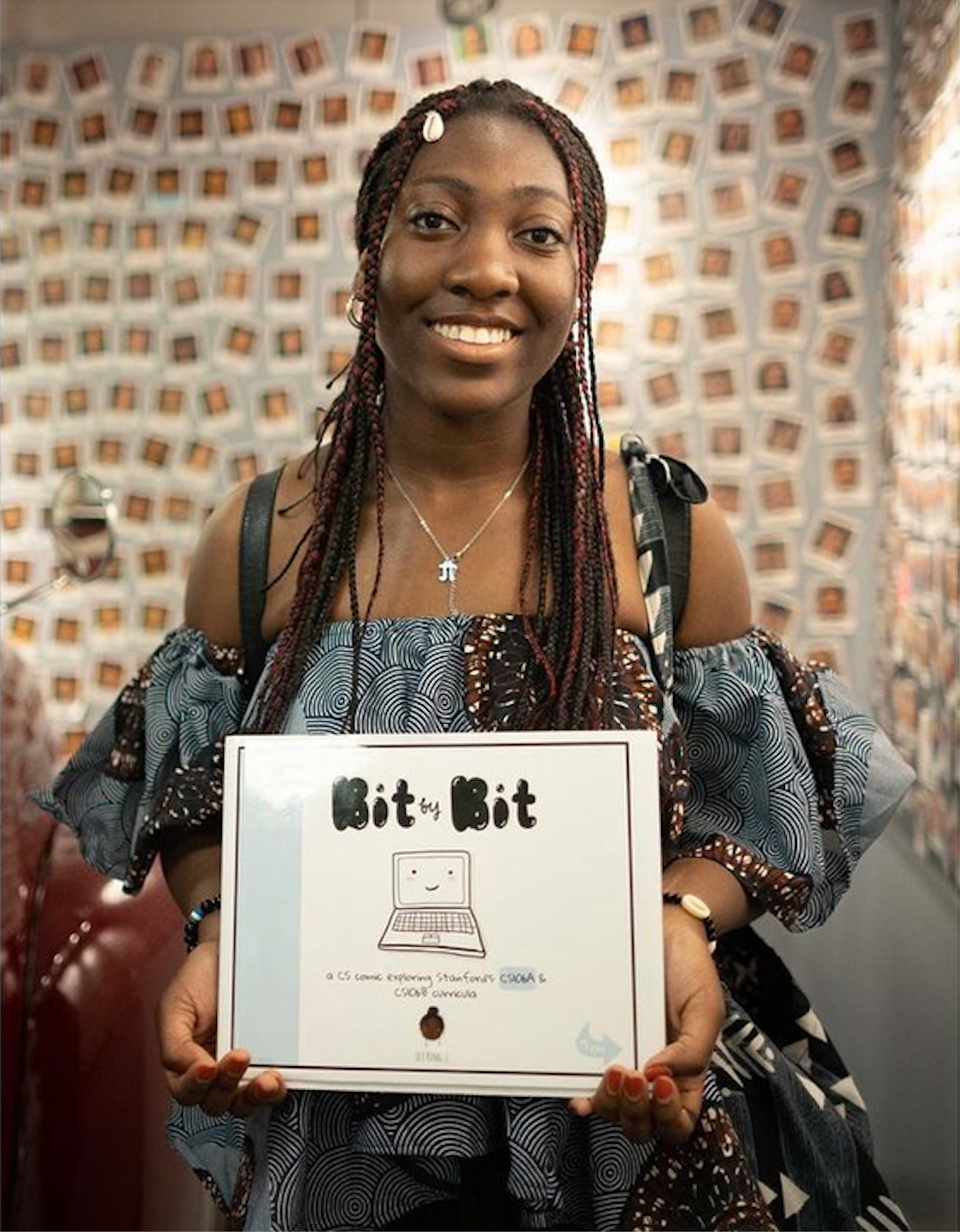Harboring an interest in fractals since she was young, Ecy King ’23 M.A. ’24 thinks in tic-tac-toe grids. King described the creation of her educational comic “Bit by Bit” plainly: “It was a labor of love.”
King published “Bit by Bit” with the Stanford University Press in June as a supplemental resource for students taking CS 106A and 106B. The story’s conceptual journey is sketched through her visual thinking method of “Fractal Gridding.” More recently, King published a second educational comic titled “Una Kushε” directed toward computer science teaching assistants (TAs).
During her time at Stanford, she served as sophomore, junior and senior class president, as well as a TA for several computer science classes — including CS 106A, CS 106B and CS 100ACE.
A resident of Central California, King recounted hearing from her community about Stanford’s “intellectual vitality,” which aligned with her hopes, as a high school student.
“I wanted to be somewhere where my nerdiness would be appreciated and cultivated, and so I applied,” King said.
Over the course of her undergraduate years, King took a wide range of symbolic systems classes, in addition to other departments’ IntroSems and independent projects. King especially enjoyed the intersectionality of these classes. “You had people who were interested in multiple perspectives,” she said. “We had interdisciplinary discussions that I still carry with me today.”
Outside of academics, King was involved with several creative projects at Stanford. “I’m obsessed with this thing called Fractal Gridding,” King said. “I take notes with a tic-tac-toe-like structure.”
As a TA for computer science courses and Additional Courses for Engineers (ACE) sections, teaching was central to King’s Stanford experience. While studying abroad at Oxford University, King wondered about combining these two interests — Fractal Gridding and teaching — and perhaps even incorporating doodling. This mix led to her motivation for the comic-style of “Bit by Bit.”
King published the book with funding from a Vice Provost for Undergraduate Education’s major grant. The “inception of idea” for “Bit by Bit” dated back to February 2022 and King completed the grant in September 2022.
Over 10 weeks during June to August 2022 as a CS 106B TA, King said she would sketch ideas during lectures. King would then produce sketches at higher fidelity and format them in Canva. “Then boom: it was in the bookstore,” she said.
“Bit by Bit” inspired King to start a second project, “Una Kushε,” an educational comic for computer science teaching. “Una Kushε” was funded by a Center for Teaching and Learning Graduate Resources for Equity and Access in Teaching grant.
Computer science professor and mentor Christina Wodtke detailed King’s growth as a creator of these two book projects. “When I first met her she had good skills in drawing, but I’ve seen her take that much farther in both her digital work and her physical work, from stickers to her book on programming,” she said.
For current students interested in similar projects, King outlined two pieces of advice.
“One, there’s the Stanford major grant over the summer and there’s minor grants over the school year,” she said. “Two, there’s an educational publishing class, ENGLISH 119/318 gives a lot of helpful advice on article and book publishing.”
King also emphasized the importance of community which kept her grounded. King’s circles included her peers from the Stanford Arts Intensive and from the New York Alternative Spring Breaks programs. King’s connections also extended back to her time in her freshman dorm, Soto.
Close friend and fellow Soto resident Daniel Newton ’23 shared King’s love for those around her, specifically through “’23 Questions,” a card game she produced for the class of 2023. “The goal of the card game — to introduce second-degree connections to one another — is a product of Ecy’s excitement and optimism about what can happen when two Stanford undergrads meet,” Newton shared.
King’s uplifting character was similarly described by close friend Roxane Somda ’23: “Even in a 20 to 30 minute conversation with her, you would leave it thinking ‘Wow, I could do so much with my time here.’”
From a professor’s standpoint, Wodtke similarly recalled King’s sense of excitement. “When Ecy is in my class, my heart lights up,” she said. “She asks the hardest questions and she attacks all challenges with a joyful ferocity that’s a pleasure to watch. She has that contagious passion for learning and design that inspires others around her.”
Going forward, King sees herself further pursuing her interests in education and technology creatively in different fields. “I’m working currently at McGraw Hill doing data science on the school data science team. I like that space and I see myself there for some time,” King said.
King hopes to continue to explore Fractal Gridding and related projects. “With Fractal Gridding, I just released an alpha testing software I created, so it’s fun to see people interface with that.” King is also currently experimenting with characters for a future Fractal Gridded comic on math.
As a final remark, King encouraged current students to follow their curiosities.
“A lot of the time I did something because I was curious or said something to someone because I was curious, and it ended up impacting me in ways I couldn’t have even imagined,” King said. “Stanford is this hub for projects, resources and innovations that one could literally dream up and do. Keep track of those and keep curiosity top of mind.”
